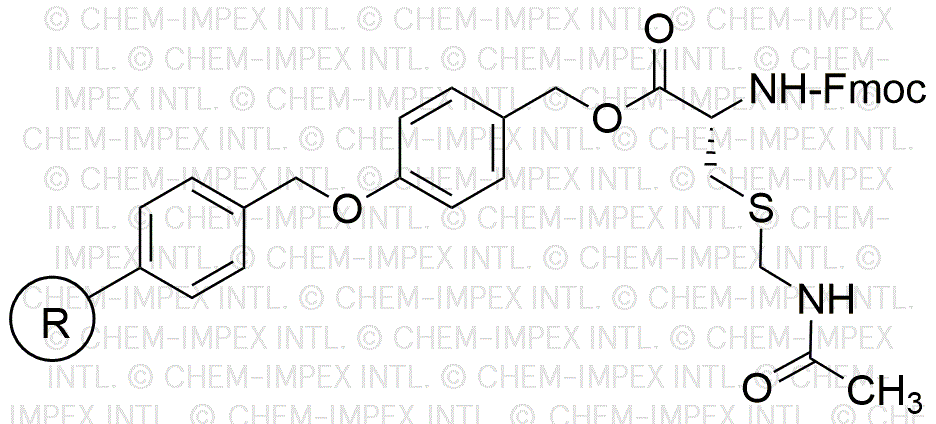Fmoc-S-acetamidomethyl-D-cysteine 4-alkoxybenzyl alcohol resin is widely utilized in research focused on:
- Peptide Synthesis: This resin is essential for the solid-phase synthesis of peptides, allowing for the efficient assembly of amino acids in a controlled manner.
- Drug Development: It plays a crucial role in the design and production of peptide-based drugs, particularly in the pharmaceutical industry, enhancing drug efficacy and specificity.
- Bioconjugation: The resin facilitates the attachment of peptides to other biomolecules, which is vital for creating targeted therapies and diagnostic tools in biotechnology.
- Research in Proteomics: It aids researchers in studying protein interactions and functions by enabling the synthesis of modified peptides that can mimic natural proteins.
- Customizable Applications: The versatility of this resin allows for modifications, making it suitable for various applications in both academic and industrial settings, thus meeting diverse research needs.
Informations générales
Propriétés
Sécurité et réglementation
Applications
Fmoc-S-acetamidomethyl-D-cysteine 4-alkoxybenzyl alcohol resin is widely utilized in research focused on:
- Peptide Synthesis: This resin is essential for the solid-phase synthesis of peptides, allowing for the efficient assembly of amino acids in a controlled manner.
- Drug Development: It plays a crucial role in the design and production of peptide-based drugs, particularly in the pharmaceutical industry, enhancing drug efficacy and specificity.
- Bioconjugation: The resin facilitates the attachment of peptides to other biomolecules, which is vital for creating targeted therapies and diagnostic tools in biotechnology.
- Research in Proteomics: It aids researchers in studying protein interactions and functions by enabling the synthesis of modified peptides that can mimic natural proteins.
- Customizable Applications: The versatility of this resin allows for modifications, making it suitable for various applications in both academic and industrial settings, thus meeting diverse research needs.
Documents
Fiches de données de sécurité (FDS)
La FDS fournit des informations de sécurité complètes sur la manipulation, le stockage et l’élimination du produit.
Spécifications du produit (PS)
Le PS fournit une description complète des propriétés du produit, notamment sa composition chimique, son état physique, sa pureté et les exigences de stockage. Il détaille également les plages de qualité acceptables et les applications prévues du produit.
Certificats d'analyse (COA)
Recherchez des certificats d'analyse (COA) en saisissant le numéro de lot du produit. Les numéros de lot et de lot se trouvent sur l'étiquette d'un produit, après les mots « Lot » ou « Lot de fabrication ».
Numéro de catalogue
Numéro de lot/série
Certificats d'origine (COO)
Ce certificat d'exploitation confirme le pays dans lequel le produit a été fabriqué, et détaille également les matériaux et composants utilisés et s'il est issu de sources naturelles, synthétiques ou autres sources spécifiques. Ce certificat peut être requis pour les douanes, le commerce et la conformité réglementaire.
Numéro de catalogue
Numéro de lot/série
Fiches de données de sécurité (FDS)
La FDS fournit des informations de sécurité complètes sur la manipulation, le stockage et l’élimination du produit.
DownloadSpécifications du produit (PS)
Le PS fournit une description complète des propriétés du produit, notamment sa composition chimique, son état physique, sa pureté et les exigences de stockage. Il détaille également les plages de qualité acceptables et les applications prévues du produit.
DownloadCertificats d'analyse (COA)
Recherchez des certificats d'analyse (COA) en saisissant le numéro de lot du produit. Les numéros de lot et de lot se trouvent sur l'étiquette d'un produit, après les mots « Lot » ou « Lot de fabrication ».
Numéro de catalogue
Numéro de lot/série
Certificats d'origine (COO)
Ce certificat d'exploitation confirme le pays dans lequel le produit a été fabriqué, et détaille également les matériaux et composants utilisés et s'il est issu de sources naturelles, synthétiques ou autres sources spécifiques. Ce certificat peut être requis pour les douanes, le commerce et la conformité réglementaire.


